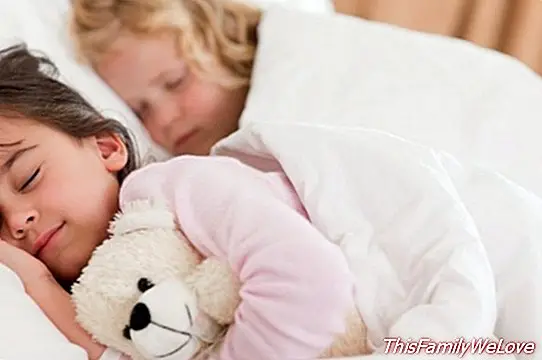4 benefits of sleeping outside the home

Children, at 8 or 9 years old, begin to be more independent and have more confidence with their friends. At this age, sleeping at a friend's house has great appeal. Everything that means getting out of the ordinary is something that catches your attention. Further, Sleep outside the house It can become a good occasion to help you improve in autonomy, good manners and social relationships.
The benefits for your child sleeping outside the home
Although many times sleeping away from home generates fear in the parents, letting your child spend a night away from home, besides being an adventure for him, will bring a series of benefits that will improve his education. Therefore, we propose you 4 benefits of sleeping outside the home for your children:
1. Learn to share
Sleeping away from home will be a positive experience if you are invited to the home of happy families, with good principles, cousins with whom you get along, etc. When it comes to single children or with few siblings, it also makes them very happy to share their joy, the obligatory generosity in which they live, the great dinners, the fights and the pardons, there is no doubt that their hearts enlarge.
On the other hand, it is not good to fall into any extreme: never leave him or leave him whenever he asks. If the child constantly asks to leave the house on weekends we have to reflect on two things: if it is necessary to promote more in him the importance of making plans as a family, or if he is not comfortable at home and that is why I think a thousand things to leave your own home. In addition, facing adolescence it is possible that if they are out of the home by custom, then it costs much more to get a foot in the house at this stage.
2. An opportunity to grow in autonomy
A common misconception in many parents is to pretend to prolong children's childhood beyond their due, preventing them from assuming responsibilities in practice. It would be detrimental if, after seven or eight years, it were thought that a child is still too young to go to sleep at the house of a known family or their cousins.
In this sense, from small it is necessary to accustom them to eat and dress themselves, to learn their name and address, to start doing simple errands, to give them orders at home. Teach them to do for themselves what, reasonably and according to their age, they are capable of doing. Thus, when new situations typical of each stage arise, they will be perfectly prepared. Activities that involve a certain distance from the presence and protection of parents are very appropriate ways to take steps in autonomy.
3. Learn to be educated outside the home
A question that parents often ask is whether their child is going to behave well, if they have that minimum level of education that leads them to behave correctly in a strange house. Sleeping outside the home is a good time to check that what you have learned at home is able to put it into practice when you are away.
The child will learn to value the new situation in which he finds himself and to realize that he can not act in the same way or with the same familiarity in his house as in a strange one. But, just as there is no responsibility without freedom, that is, without occasions to prove it, one can not expect them to learn to have good manners if they are not given opportunities. You may know that you do not eat with your mouth open at the table, after having repeated it tirelessly at home, but you must also provide the possibility that when you get to your friends' house take care of this detail without being told.
4. Improvement of their social skills
Since they are small you have to accustom the children to interact with others and this type of situation can help them. In the Primary stage they begin to expand their circle of friends, to get out of themselves and to realize that others can be their friends. Even if it's a shy girl or boy, spending time with other children of your age outside the home will force you to practice your social skills: say hello, be nice, participate in the conversation, answer questions, etc. . All training for the future.
Maria Lucea
Advisor: Maite Mijancos. Director of the IEEE




